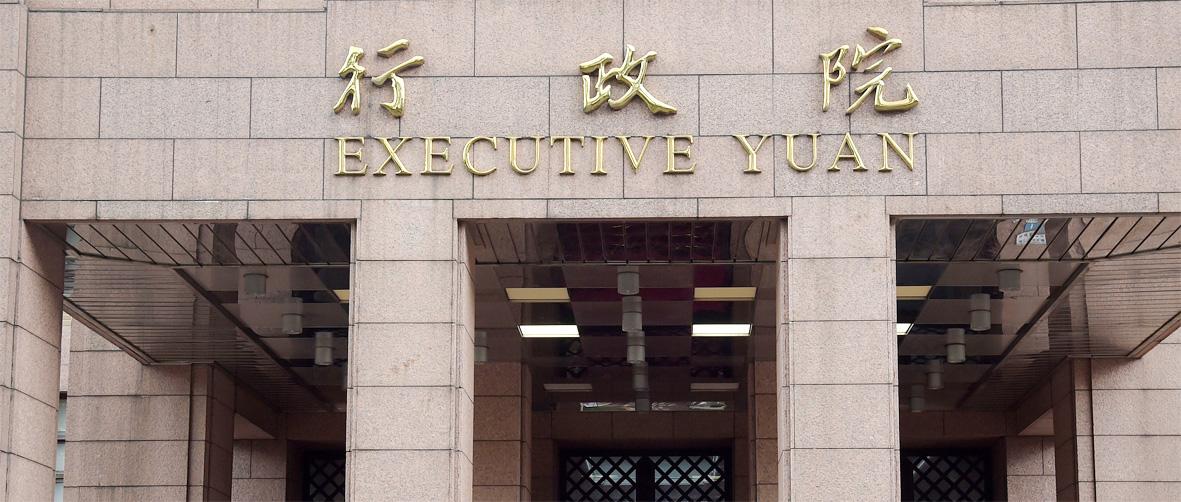The Executive Yuan yesterday approved a carbon pricing scheme to be imposed in phases starting with large emitters, with preferential rates granted to enterprises working to reduce their carbon output.
Although details are still being decided, the scheme would involve differential pricing to encourage emissions reduction, Environmental Protection Administration Deputy Minister Tsai Hung-teh (蔡鴻德) told a news conference after the weekly Cabinet meeting.
Phased implementation would begin with large emitters, meaning enterprises that produce more than 25,000 tonnes of carbon per year, Tsai said.

Photo: CNA
Other groups would be added successively after the initial law is passed, he added.
As for when the carbon fee would be introduced, Tsai estimated sometime in 2024 or 2025.
The scheme is included in sweeping amendments to the Greenhouse Gas Reduction and Management Act (溫室氣體減量及管理法) approved by the Cabinet yesterday, to be renamed the “climate change response act” if enacted.
The changes most notably seek to bring the law in line with the government’s goal of achieving net-zero emissions by 2050.
The act currently aims to cut emissions to less than half of 2005 levels by 2050, a target derided by climate activists as unambitious.
Premier Su Tseng-chang (蘇貞昌) lauded the passage as another milestone to commemorate Earth Day today, after President Tsai Ing-wen (蔡英文) a year earlier marked the occasion by setting the carbon neutrality goal.
Recognizing the urgent need to amend the conflicting target in climate law, Su told attendees at a meeting of the National Council of Sustainable Development in August last year to expedite the process.
Yesterday’s approval and a net-zero emissions road map released by the National Development Council late last month “are not only the first step to completing a legal system to support climate action, but are also significant for their signaling and substance,” Su said.
He also highlighted other important additions to the law, including a special clause on adaptation to climate change, clarifying the sustainable development council’s role as coordinator and requiring local governments to convene climate response committees.
With an eye to economic concerns, apart from carbon pricing, the amendments also include provisions to develop talent and technologies to help combat climate change, he added.

Intelligence agents have recorded 510,000 instances of “controversial information” being spread online by the Chinese Communist Party (CCP) so far this year, the National Security Bureau (NSB) said in a report yesterday, as it warned of artificial intelligence (AI) being employed to generate destabilizing misinformation. The bureau submitted a written report to the Legislative Yuan in preparation for National Security Bureau Director-General Tsai Ming-yen’s (蔡明彥) appearance before the Foreign Affairs and National Defense Committee today. The CCP has been using cognitive warfare to divide Taiwanese society by commenting on controversial issues such as Taiwan Semiconductor Manufacturing Co’s (TSMC, 台積電) investments in the

HELPING HAND: The steering committee of the National Stabilization Fund is expected to hold a meeting to discuss how and when to utilize the fund to help buffer the sell-off The TAIEX plunged 2,065.87 points, or 9.7 percent, to close at 19,232.35 yesterday, the highest single-day percentage loss on record, as investors braced for US President Donald Trump’s tariffs after an extended holiday weekend. Amid the pessimistic atmosphere, 945 listed companies led by large-cap stocks — including Taiwan Semiconductor Manufacturing Co (TSMC, 台積電), Hon Hai Precision Industry Co (鴻海精密) and Largan Precision Co (大立光) — fell by the daily maximum of 10 percent at the close, Taiwan Stock Exchange data showed. The number of listed companies ending limit-down set a new record, the exchange said. The TAIEX plunged by daily maxiumu in just

INVESTIGATION: The case is the latest instance of a DPP figure being implicated in an espionage network accused of allegedly leaking information to Chinese intelligence Democratic Progressive Party (DPP) member Ho Jen-chieh (何仁傑) was detained and held incommunicado yesterday on suspicion of spying for China during his tenure as assistant to then-minister of foreign affairs Joseph Wu (吳釗燮). The Taipei District Prosecutors’ Office said Ho was implicated during its investigation into alleged spying activities by former Presidential Office consultant Wu Shang-yu (吳尚雨). Prosecutors said there is reason to believe Ho breached the National Security Act (國家安全法) by leaking classified Ministry of Foreign Affairs information to Chinese intelligence. Following interrogation, prosecutors petitioned the Taipei District Court to detain Ho, citing concerns over potential collusion or tampering of evidence. The

‘COMPREHENSIVE PLAN’: Lin Chia-lung said that the government was ready to talk about a variety of issues, including investment in and purchases from the US The National Stabilization Fund (NSF) yesterday announced that it would step in to staunch stock market losses for the ninth time in the nation’s history. An NSF board meeting, originally scheduled for Monday next week, was moved to yesterday after stocks plummeted in the wake of US President Donald Trump’s announcement of 32 percent tariffs on Taiwan on Wednesday last week. Board members voted to support the stock market with the NT$500 billion (US$15.15 billion) fund, with injections of funds to begin as soon as today. The NSF in 2000 injected NT$120 billion to stabilize stocks, the most ever. The lowest amount it